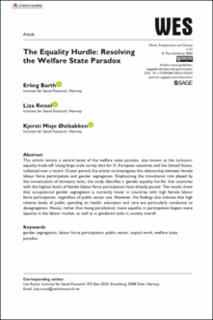The Equality Hurdle: Resolving the Welfare State Paradox
Peer reviewed, Journal article
Published version
Permanent lenke
https://hdl.handle.net/11250/3084038Utgivelsesdato
2023Metadata
Vis full innførselSamlinger
- Publikasjoner fra CRIStin [715]
- Tidsskriftpublikasjon [388]
Sammendrag
This article revisits a central tenet of the welfare state paradox, also known as the inclusion-equality trade-off. Using large-scale survey data for 31 European countries and the United States collected over a recent 15-year period, the article re-investigates the relationship between female labour force participation and gender segregation. Emphasising the transitional role played by the monetisation of domestic tasks, the study identifies a ‘gender equality hurdle’ that countries with the highest levels of female labour force participation have already passed. The results show that occupational gender segregation is currently lower in countries with high female labour force participation, regardless of public sector size. However, the findings also indicate that high relative levels of public spending on health, education and care is particularly conducive to desegregation. Hence, rather than being paradoxical, more equality in participation begets more equality in the labour market, as well as in gendered tasks in society overall. The Equality Hurdle: Resolving the Welfare State Paradox
